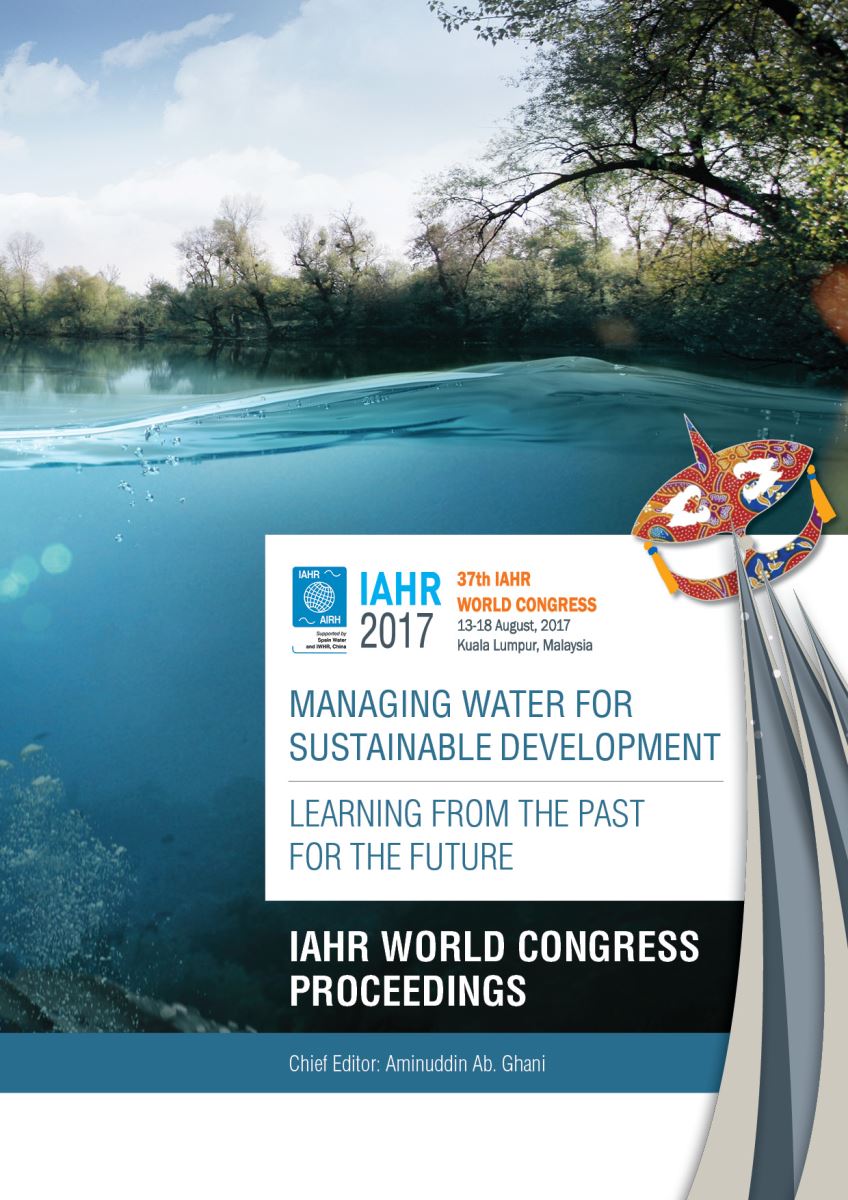IAHR Document Library

Proceedings of the 37th IAHR World Congress (Kuala Lumpur, 2017)
- ISSN Online: 2521-716X
- ISSN Print: 2521-7119
- ISBN:
- Publisher: IAHR & USAINS HOLDING SDN BHD
- Editor(s): Aminuddin Ab. Ghani
- Related: 37th IAHR World Congress (2017, Kuala Lumpur, Malaysia)
Every two years our community gathers together at the IAHR World Congress, and in August 2017 around 1200 participants from 61 countries met at the Putra World Trade Center in Kuala Lumpur, Malaysia. 911 full papers were accepted out of 1324 abstracts submitted. The congress covered seven main themes comprising: River and Sediment Management, Flood Management, Environmental Hydraulics and Industrial Flows, Coastal, Estuaries and Lakes Management, Urban Water Management, Water Resources Management, Hydroinformatics/Computational Methods. Our Congress opened on Monday 14th August by The Honourable Deputy Prime Minister of Malaysia. There were a total of 12 keynotes during the week involving leading specialists in the hydro environment domain from around the world. The Congress closed on the Friday after the Malaysian Deputy Minister for Science, Technology and Innovation gave a highly personal talk about his education, and the differ ences between public perception of water and the environment and that of scientists.
Contents
Cover
Keynote
Theme 1: River and Sediment Management
1a River Conservation and Restoration
1b River Sediment Management and Morphodynamics
1c Debris Flow and Reservoir Sedimentation
1d Flow Interaction With Hydraulic Structure
1e Dam Decommissioning
Theme 2: Flood Management
2a Flood Risk Assessment
2b Urban Flood Management
2c Flood Mitigation and Control
2d Flood Disaster and Adaptation Measures
2e Flood Recovery and Resiliency
Theme 3: Environmental Hydraulics and Industrial Flows
3a Ecohydraulics
3b Sustainable Use of Terrestrial Ecosystem and Rehabilitation of Water Systems
3c Sustainable (Renewable) Energy
3d Industrial Flow Management
3e Hydraulics Machinery
Theme 4: Coastal, Estuaries and Lakes Management
4a Coastal and Estuary Morphodynamics
4b Estuaries and Shore Protection
4c Dynamics and Exchanges in Estuary-Coastal Zone
4d Inland and Coastal Lake Management
4e Coastal Structures (Ports and Harbours)
Theme 5: Urban Water Management
5a Rainfall-Runoff Processes and Modelling
5b Assessment of Stormwater and Cso Quality and Its Impacts
5c Sewer Sediment
5d Stormwater Management
5e Combined Sewer Overflow (Cso) Control
Theme 6: Water Resources Management
6a Water Resources Management Under Increasing Uncertainty
6b Alternative Water Resources
6c Conflict Resolution in Water Management
6d Advanced Water Resources Systems Analyses
6e Groundwater Hydraulics
Theme 7: Hydroinformatics/Computational Methods and Experimental
7a High Performance Computing and 5th Generation of Modelling Systems
7b Impacts of Pollutants on the Environment
7c Development and Application of Soft Computing Tools in Hydroinformatics
7d Instrumentation and Experimental Methods
7e Big Data and Data Acquisition Technologies
Special Session
SS 1 Transients in Pipes
SS 2 Sustainable Water Resources Planning & Management Under Climate Change
SS 3 Green Infra as Disaster Risk Reduction Measures in the Asian-Pacific Region
SS 4 the Path to Resiliency in Low Gradient Coastal Regions for Present and Future Conditions
SS 5 Function of Governance to River Restoration Under the Climate Change
SS 6 Coastal Reservoir - a Technology That Can Develop Freshwater From the Sea Without Desalination
Review Process
The papers included in this volume were part of the 37th IAHR World Congress cited on the cover and title page. Papers were selected and subjected to review by the Editor and the International Scientific Committee and followed a revision process with the following steps: First, several of the committees involved in the organization of the congress established a set of technical criteria for the Committee in charge of the revision. Submitted papers were sent to one or two experts in the field. Authors were then asked to include the necessary amendments and follow the reviewers' comments, and their work was reviewed until the final version was approved by the Editor.
Ethical guidelines and Code of Conduct
In addition to the technical criteria, IAHR publications follow the Ethical Guidelines and Code of Conduct provided by the Committee of Publication Ethics (COPE). A Publication Ethics and a Publication Malpractice statement are publicly available throughout the entire review process.
The 37th IAHR World Congress proceedings are long-term preserved following the IAHR Policy of digital preservation archives.
| ID | Title | Authors | Year |
|---|---|---|---|
| 2669 | Issues Concerning Spatial Data Collection and Processing for Urban Flood Modelling |
Ahmad Fikri Abdullah, Zoran Vojinovic, Vorawit Meesuk
|
2017 |
| 2670 | Implementation of a Methodology to Review High Hazard Dams |
Fernando J. González Villarreal, Jonathan Bolaños Castillo, Miguel Angel Bribiesca Rodriguez, Irving Garcia Reyes
|
2017 |
| 2671 | Identifying Urban Flooding Vulnerability Using MCDM Approach |
Gyumin Lee, Jinwon Choi, Kyung Soo Jun
|
2017 |
| 2672 | Floodss: Call for Community Action |
Marian Muste
|
2017 |
| 2673 | Proposition of Flash Flood Framework Using Object Oriented Bayesian Approach |
Quan Liu, Brahim Boutkhamouine, Ayeley Tchangani, Helene Roux, François Peres
|
2017 |
| 2674 | Evaluation of Difference Mesh Size for Overland Routing Model |
Wan Hazdy Azad Wan Abdul Majid, Lariyah Mohd Sidek, Hidayah Basri, Suhani Saidin, Abd. Jalil Hassan
|
2017 |
| 2675 | Flood Frequency Analysis and Curves of Equal Predicted Peak Discharge |
Thottungal Drissia, Vinayakam Jothiprakash, Alayil Bahuleyan Anitha
|
2017 |
| 2676 | A New Approach for Improving Flood Model Predictions Based on the Sequential Assimilation of Sar-Derived Flood Extent Maps |
Renaud Hostache, Marco Chini, Laura Giustarini, Melissa Wood, Giovanni Corato, Patrick Matgen
|
2017 |
| 2677 | Numerical Analysis of Inundation Flow Due to Heavy Rainfall in the Shirakawa River on July, 2012 |
Xiang Chen, Ryuichi Hirakawa, Terunori Ohmoto
|
2017 |
| 2678 | Ogee Weir Crest Definition: Historical Advance |
Willi H. Hager, Oscar Castro-Orgaz
|
2017 |